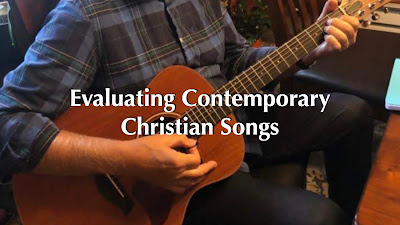I've been involved in leading and playing Christian worship music more than thirty years, and have witnessed how worship music has changed and developed over that time. However, the message of Christian music has not changed at all. Over the centuries, the styles may have changed, but not the truths of the Gospel message that are found in the lyrics of Christian songs.
Years ago, I began paying close attention to Christian song lyrics, especially who they were addressed to and what the context of the song was about. My desire was to categorize Christian songs and it came about from reading some of the Apostle Paul's writings. In two separate scriptures, he refers to 3 types of songs: Psalms, Hymns, and Spiritual Songs.
Don't be drunk with wine, because that will ruin your life. Instead, be filled with the Holy Spirit, singing psalms and hymns and spiritual songs among yourselves, and making music to the Lord in your hearts. And give thanks for everything to God the Father in the name of our Lord Jesus Christ. (Ephesians 5:18-20 NLT)
Let the message about Christ, in all its richness, fill your lives. Teach and counsel each other with all the wisdom he gives. Sing psalms and hymns and spiritual songs to God with thankful hearts. (Colossians 3:16 NLT)
Since Paul's letters were written about 2000 years ago, there's no way to know exactly how "psalms, hymns, and spiritual songs" were differentiated. However, I found that even today, we, like Paul, can split Christian songs into 3 different types, and that these categories can be very useful to us in our personal and corporate worship.
Here are my 3 categories of Christian songs. Remember, it's important to note who the songs are addressed to, and what the context of the message is.
1)Spiritual Songs
Spiritual songs are those whose lyrics are mainly about Christians or about the Church. They are usually addressed to other believers and not addressed directly to God or Jesus. Spiritual songs edify or build up the church, while they indirectly edify God. Many times these are personal testimonies, or truths about the church. They use "I", "Me", and "We" extensively.
Examples: The Hymn, "It Is Well With My Soul"
The Hymn, "Amazing Grace"
2) Praise Songs
Praise songs are those whose lyrics are mainly about God or Jesus, and not about the believer or the church. Like Spiritual Songs, they are usually addressed to other believers. These songs always boast about God -- who He is or what He's done. -- but are not addressed directly to God. They use "He", "God", and "Jesus" a lot.
Examples: "Our God Is An Awesome God"
"Mighty To Save"
3) Worship Songs
Worship songs are those whose lyrics are addressed directly to God or Jesus. These are the most intimate songs because if you sing them with a sincere heart, they are essentially a prayer in song. If you take the lyrics as your own, you are talking (singing) to God or Jesus. I call these songs melodic prayers. They are a powerful catalyst in personal worship. These songs use "You" and "You're" extensively.
Examples: "Good Good Father" (You're a good, good Father)
"Goodness Of God" ( I love You Lord)
Now I agree that many times songs are a blend of these categories. But generally, you can categorize them if you try. It is good practice when listening to a Christian songs to evaluate them. And it is especially useful to recognize when a song is a "Worship Song", addressed to directly to God, and to try to relate to it, using it as your own worship prayer.
As a worship leader, I have many times used these 3 categories of songs strategically in developing the flow of a worship service. For example, a Spiritual song can be one to start the service. Praise songs can then be used to deliver energy and conviction. Worship songs can be used in intimate settings, such as Communion or Prayer times. Spiritual or Praise songs make great endings to a service.
My hope is that you will become more aware of the types of Christian songs you are singing or listening to (Spiritual songs, Praise songs, Worship songs), and that this will help you to become a better worshiper.

I totally agree with what you said. Christian music has evolved in such a way that music is reaching out to many of the youth today and encourages them to engage in the service. Even non-Christians are listening to this type of music. Music is a very powerful tool, especially when it's used in a right and positive way.
ReplyDeleteAmen!!!
Delete